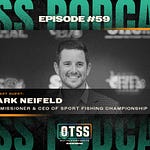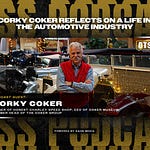CEO of Good Boy Vodka Alex Pratt on “Only The Strong Survive”
Alex Pratt's first foray into the workforce started in the family business. He was the third generation of Pratts involved in Pratt Industries, a manufacturer of trailers for both heavy-duty and lighter utility applications. Eventually, the family business was sold to a private equity group, and Alex stayed on to run the sales department. However, the company culture had changed under new ownership, and Alex didn’t necessarily enjoy working for other people.
Looking for a change and more freedom, Alex started Good Boy Vodka as a side project. The new alcoholic beverage company quickly grew to the point where Alex left Pratt Industries to run Good Boy Vodka full-time. Now, he spends his days as its CEO and founder, guiding the rapid growth and leading the marketing efforts of the innovative company, which achieved a massive 930% increase in revenue last year.
On this episode of “Only The Strong Survive,” host Dan Kahn discusses with Alex Pratt what he has learned from his remarkable entrepreneurial journey with Good Boy Vodka. From transitioning to a family business to starting his own, Alex gained plenty of insight into what it takes to run a successful brand. Click on the icon above to give the full episode a listen, and here are our top five takeaways from Dan and Alex’s in-depth conversation:
Breaking into highly competitive markets takes different tactics.
Distribution is always critical for retail operations.
Having a brand identity separates you from faceless competitors.
Partnering with the right brand ambassadors can be a huge plus for growth.
Finding the right position for an employee is better than letting them go.
You Have to do Something Different to Break into a Crowded Field
The alcoholic beverage market is crowded and competitive. Almost every celebrity has their own label, and new companies are popping up seemingly daily. To stand out in that congested space, Alex knew he had to have a different product to separate Good Boy Vodka from the herd. The idea came to pair natural tea, fruit juice and Good Boy vodka in refreshing, ready-to-drink cans and expand the business from there.
“It is a very competitive and well-established market,” says Alex. “Our can business is allowing us to dive deeper into the vodka business. We pivoted towards the cans that build a lot of revenue and velocity for us as a company. Now, we inject our vodka into all of these accounts that are doing well with our John Daly or Travis Pastrana (canned) drinks. We are building a consumer base with our cans and now they want Good Boy vodka if they are having a vodka and soda.”
Good Distribution is Vital to Any Business
You can have the best products in the world, but your sales will be non-existent if you can’t get them in front of customers. E-commerce has the luxury of shipping products directly to consumers. However, distribution is essential for any brand that deals with having a physical product in stores. For the complex distribution model of alcoholic beverages, the proper distribution channels are even more critical.
“You can have a product that saves people's lives, and if you can’t get it to market, guess what, people don’t get to buy it. It is super tough,” says Alex. “For us, it was grassroots. We started with Anheuser-Busch Group, and they did well for us. We were then awarded a Walmart contract and had to have statewide distribution, so we used a bigger distribution company called Breakthru Beverage. Then, from there, we used the Southern Glazer’s and Johnson Brothers of the world. You just have to build one SKU at a time and build your velocities.”
Brand Differentiation is as Important as Having a Different Product
Having products that are different from your competitors is always a good idea. However, to stand out in a crowded space, your brand must also be different. Alex does this with the Good Boy Foundation, which supports veterans, warrior dogs and other charitable organizations, along with the “Every Pour Helps a Pup” tagline. Both give Good Boy Vodka a mission and identity and fulfill Alex’s father’s mantra of always giving back.
“We knew we always had to differentiate our brand above and beyond a great product and good packaging. Ever since we were kids, my dad instilled in us that we always need to give back,” says Alex. “We came up with the tagline ‘Every Pour Helps a Pup,’ and the idea behind it is a portion of the proceeds of our company we give directly back. We were giving back to two main foundations when we started. One was Pet For Vets, and one was the Warrior Dog Foundation. From there, our mission grew, and I started my own non-profit called the Good Boy Foundation, which gives to hundreds of charities.”
The Right Brand Ambassadors Can Make a Huge Difference
Teaming with the right brand ambassadors can make a big difference in the success of a brand. For Alex, it wasn’t just about how big an audience they could reach. Instead, he wanted to work with brand ambassadors that perfectly aligned with Good Boy Vodka’s brand identity. Carefully choosing golfing legend and epic beard enthusiast John Daly, along with motorsports icon Travis Pastrana, as ambassadors helped build authenticity and introduce Good Boy Vodka to different markets.
“Obviously, the celebrities have helped. John Daly’s demographic is from eight-year-olds to 80-year-olds. They all know who John Daly is and like golf,” says Alex. “Then we look at Travis Pastrana, who is the most legendary motorsports guy of all time. I have these two widely different demographics now coming together under one brand. When you do that, you are capturing a lot of consumers.”
Hire the Right People for the Right Positions
Finding the right people for your organization is a challenge. However, being inflexible with employees after you hire them can add to that difficulty. Sometimes, they might not be the best fit for a particular position, but they can still add value to your company. Being able to pivot and find the right spot for them is a better option than letting them go.
“I was hiring a lot of people to do jobs that they weren’t good at rather than really trying to understand the individual and figure out where they could add value. Some people are really good at something and not everyone is good at everything. Rarely is someone good at everything. The more I have learned about the industry, the more I can quickly tell where people will fit,” says Alex. “Not trying to change people and getting people into the right positions is one of the biggest reasons why we are growing now much faster than before.”












